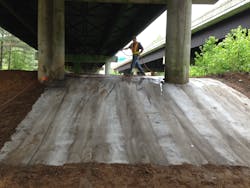Contractor-friendly GCCM solution quickly rehabilitates I-95 in North Carolina
As the main U.S. highway along the East Coast, Interstate 95 is one of the busiest and most important in the country. Like many others, it requires constant maintenance and oversight that can be troublesome for many state departments of transportation. One such problem arose on the I-95 South bridge deck above North Carolina’s Highway 87, where a leaking expansion joint was causing erosion of the slope that protects the bridge piles underneath and threatening the integrity of the entire structure.
In early 2013, NCDOT Bridge Maintenance Division 6 consulted with Pomona Pipe Products, a full-service supplier of civil engineering products, on viable repair options that would limit maintenance requirements and prevent further erosion of the 600-sq-ft slope. In addition to cost savings, NCDOT also wanted to use a contractor-friendly solution to minimize environmental risks in the area.
Slope paving, rip-rap and turf reinforcement mats (TRMs) were among the initial considerations for rehabilitating the embankment. However, each option presented a downside in terms of time and labor sensitivities, as well as traffic disruptions.
Slope paving would have required a cement truck, concrete pump and additional equipment to be brought on-site. Rip-rap installation would have also required extra equipment and man-hours to install a geotextile fabric and hand-place the rock. TRMs would have had issues rooting in the low sunlight conditions beneath the bridge, and were eliminated along with the other options.
To address those concerns, Pomona Pipe Products recommended NCDOT use Concrete Cloth geosynthetic cementitious composite mats (GCCMs) from Milliken Infrastructure Solutions. This product is a three-dimensional flexible concrete-impregnated fabric that hardens on hydration to form a durable, waterproof and fire-resistant concrete layer. Based on previous experience, Pomona Pipe knew that the GCCM product required minimal labor and supporting equipment as it is packaged in 53.6-sq-ft rolls that are easily transported by hand and can be installed without specialized tools or training, making it a sure-fire solution for the rehabilitation project.
NCDOT prepared the subgrade and keyed the GCCM into the ground at the top, bottom and sides of the slope using landscape staples. The product was fitted around the bridge piles using a simple box cutter, then hydrated and allowed to cure in place. Finally, the team grouted around the bridge piles to ensure a complete moisture barrier—all in less than half a day.
Not only did the GCCM provide exceptional ease of use for the installation crew, but also limited the amount of alkaline runoff created as opposed to traditional concrete solutions—ideally suited to meet environmental standards.
“Concrete Cloth GCCM presented significant advantages for the installation crew in terms of ease of installation,” said Donny Joyce, president of Pomona Pipe Products. “Once the crew understood where it would lay the product down, and how it would conform to the slope, the rest was a no-brainer.”
Based on the cost-effectiveness and overall success of the repair, Pomona Pipe Products has supplied NCDOT with Concrete Cloth GCCM for additional jobs, including ditch lining in swales, berm protection, and more in order to take advantage of the durability and long-term cost savings of GCCMs over and above alternative solutions.
To learn more about how GCCMs such as Concrete Cloth GCCM from Milliken Infrastructure Solutions can help solve erosion control challenges quickly and economically, contact John Hepfinger, Global Market Manager, at [email protected] or 855.655.6750.
